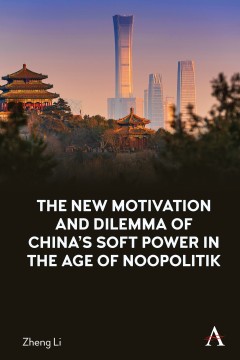The New Motivation and Dilemma of China's Soft Power in the Age of Noopolitik
By Zheng Li
Other Formats Available:
E-Book- About This Book
- Reviews
- Author Information
- Series
- Table of Contents
- Links
- Podcasts
About This Book
Since the new leadership came to power in 2012, China's domestic governance and public diplomacy have experienced some profound changes. At home, a far-reaching anti-corruption campaign significantly restored the government's credibility and reinforced public trust in the party-state's governance model, leading to a surge of nationalist pride. Internationally, the previous diplomatic principle, "hide our capacities and bide our time", gradually faded away with the emerging ideas like "China's ideas" and "China's wisdom". Good governance and anti-corruption efforts were expected to enhance soft power overseas. The party-state successfully governed the state for decades relying on its controversial governance approaches. The country also has visibly demonstrated economic and social development. However, China's growing influence has failed to be recognised as soft power, being viewed rather as sharp power most times. The monograph investigates whether China is mindful of exporting its political ideas and whether it considers its governance model to be the pillar of its soft power portfolio. The monograph also analyses how Australia, a western country with close economic ties with China, interprets China's intended narrative regarding its governance model and development. The questions are addressed through framing analysis of media coverage and in-depth interviews with Australian public diplomacy experts. Most studies in this field focus on externally directed soft power initiatives and the monograph fills the void by drawing attention to domestic affairs. The monograph sheds a new light on the relationship between domestic governance, soft power, and sharp power by examining the congruity between China's projection and Australia's mediation and also draws implications about China's public diplomacy and the future global order by sketching out Beijing’s ambitions and attempts.
Reviews
‘This is a splendid and insightful account of China’s anti-corruption campaign, the “China Dream”, soft power and governance. Valuable for many areas of study, such as politics, soft power and Western perceptions, it presents the Australian media as unnecessarily negative about China’s political system.’ —Colin Mackerras AO, Professor Emeritus, Grith University, Australia
‘The post-cold war economic love-fest between USA and China having steamed up into a “scold war”, Li seeks to examine objectively the “softness” of China’s soft power in Western eyes. In doing so he uncovers empirically how the intended attractiveness of China’s governance model, like all soft power, registers only in the minds of the “like-minded”.’ —Naren Chitty A.M., Professor, Department of Media, Communications, Creative Arts, Language & Literature, Faculty of Arts, Macquarie University, NSW, Australia
Author Information
Zheng Li completed his PhD in international communication at Macquarie University. His research interests include political values in the context of international communication.
Series
Anthem Studies in Soft Power and Public Diplomacy
Table of Contents
1. Introduction: The Anti-Corruption Campaign and “The Chinese Dream”; 2. Debating Governance and the Rule of Law: China’s Narrative and Images in Western Countries; 3. Soft Power and Sharp Power in the Age of Noopolitik; 4. The Framing of Domestic Governance: The China Model and the Chinese Dream; 5. The Framing of The Anti-corruption: When “House of Cards” Meets “In the Name of People”: China’s Anti-Corruption Campaign; 6. Discussion and Conclusion.
Links
Stay Updated
Information
Latest Tweets



